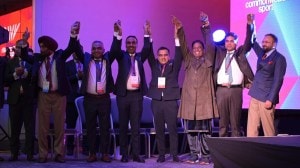Deal not at now-or-never point: White House
The controversial Indo-US civil nuclear deal has not reached the point of “now or never”, the White House has said after External Affairs Minister Pranab Mukherjee’s talks with President George W Bush here.

The controversial Indo-US civil nuclear deal has not reached the point of “now or never”, the White House has said after External Affairs Minister Pranab Mukherjee’s talks with President George W Bush here.
“We have a little bit of time before we have to say now or never. We’ve got several months to continue to work with them (India),” White House Press Secretary Dana Perino has said.
Wrapping up his two-day visit, Mukherjee, who had a 35-minute meeting with Bush and had held talks with Secretary of State Condoleeza Rice on Monday, said the UPA Government was “interested” in pursuing the Indo-US civil nuclear deal and that it was aware of the July timeline suggested by members of the US Congress. “There are some issues that are yet to be resolved. Unless those issues are resolved, it would be difficult for us to fix any particular time-frame,” he told a press conference here on Tuesday.
He explained the difficulties of moving forward on the deal without a political consensus. “We have some problems in the domestic field particularly among our supporters of the coalition Government which we are heading. We are trying to resolve that issue, but it might take some more
time,” Mukherjee said before flying to London on his way back home.
Asked if the UPA was ready to sacrifice the Government for the deal if no consensus emerged, the minister said “it’s not a question of sacrificing either the Government or the deal”.
The US has been looking at India firming up the safeguards agreement with the IAEA and securing changes in the guidelines of the 45-member Nuclear Suppliers Group (NSG) by July this year.
About the possibility of the deal getting the Congress approval by mid-year, State Department spokesman Sean McCormack spoke of the constraints if India failed to complete the processes.
“I think that as you get further and further into the Congressional calendar, I think it’s fair to say it’s more and more difficult just because of the political realities of the press of business,” he said.
“The main issue now is the Indian Government working its domestic politics,” McCormack said. Mukherjee explained that the UPA Government was trying to bring around Left allies on the deal. “Currently, we are engaged in resolving the issues and trying to find out whether we can find a meeting ground between us and a section of our supporters.” He said the Government was “interested” in ratifying this cooperation because the country was energy deficient and “we would like to have alternate source of energy”.
Mukherjee said there had been “divergent views” on the deal not only from the Left but also the BJP.



- 01
- 02
- 03
- 04
- 05




























